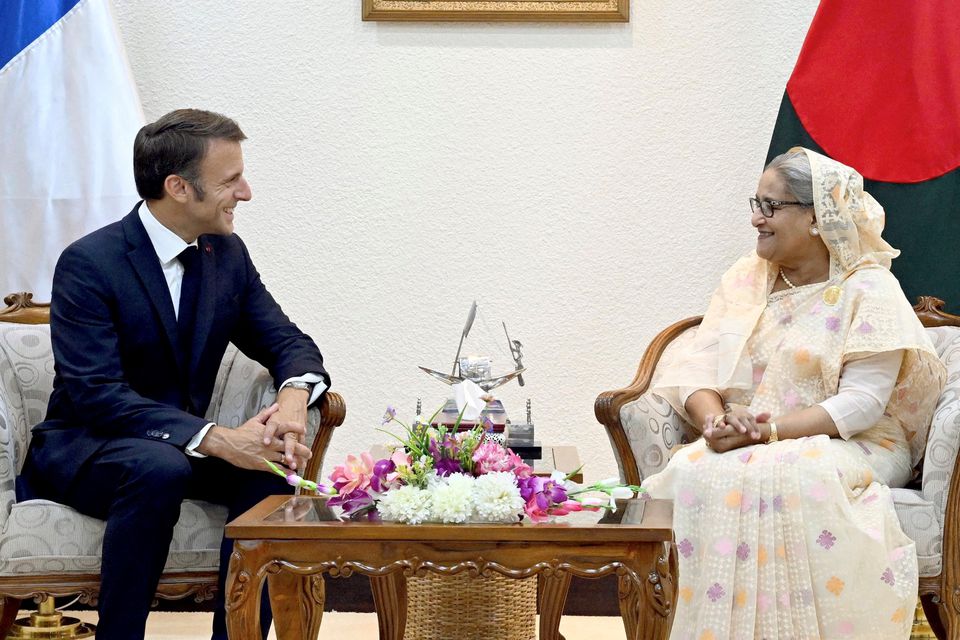The president of France, Emmanuel Macron, has completed his two-day tour to Bangladesh after attending the G20 Summit in India, where the prime minister of Bangladesh, Sheikh Hasina, was also invited as a guest. Although the focus of the visit was primarily on strengthening bilateral relations, it could also be seen as France’s efforts to establish its influence on developing Asian countries. Bangladesh is the world’s eighth-most-populated country, and with a growing economy, the country is increasingly becoming more influential in global politics, which is why the youngest-ever president of France visited Bangladesh. It is also worth mentioning that Macron is the first French president to visit the country in more than 3 decades.
The presidential visit
France is trying to strengthen its influence worldwide, following the waning influence over the continent of Africa. France once colonized a considerable part of Africa in the past, but in the modern era, these colonies became countries that became France’s allies. Recently, France has been losing these allies very quickly, as military takeovers are happening in these countries. Very recently, Gabon fell victim to a military coup. Before that, it was Niger. The Gabon coup was the eighth military takeover in a former French colony in the past three years. All of them were essential allies of France in Africa. So, with the loss of allies in Africa, France is searching for newer allies elsewhere. And Macron’s visit to Bangladesh could be considered part of the process. After he visits Bangladesh, President Macron is set to visit the French overseas territories of Caledonia, Vanuatu and Papua New Guinea, as well as a stopover in Sri Lanka. It is evident that France is focusing on the Indo-Pacific Region after losing its African allies.
During his visit, the president witnessed the signature of a monetary/financial deal to facilitate loans to Bangladesh, which will be spent on infrastructure development. A letter of intent was also signed to provide an earth observation satellite system through cooperation between Bangladesh Satellite Company Limited (BSCL) and Airbus Defense and Space SAS, France. In addition, a deal was also signed with Airbus to buy 10 wide-body aeroplanes to add to the national flagship carrier Biman Bangladesh Airlines Limited. The two leaders also discussed geopolitical stability in the Asia-Pacific region, according to Shakhawat Moon, the prime minister’s press officer. He also informed that the leaders have also discussed Bangladesh’s hope to combat climate change, and infrastructure development. The details, however, remained unclear, as the Bangladesh authorities are saying they are still working on the details.
Despite pressure from the Western media, President Macron remained silent regarding other issues that were not business or climate change. With an election looming, the US has been pushing Bangladesh for a credible election and raised questions about human rights under Sheikh Hasina’s rule, even threatening to impose visa sanctions if the situation doesn’t change. While the bilateral relationship between Bangladesh and the USA seems rocky, other notable G20 members, Russia and China, supported Sheikh Hasina. Another G20 member, India, is also on good terms with Bangladesh. So, With another G20 member country, France, extending a helping hand towards Bangladesh, it can save Bangladesh from going between a rock and a hard place.
G20 Summit and Bangladesh

Bangladesh’s neighbouring country, India, hosted the G20 summit, the country’s largest gathering of world leaders since 1983. Bangladesh was invited as a guest even though it is not a part of this organization. The members of this organization include political and economic powerhouses such as the USA, China, Russia, the UK, India, Germany, Japan, France etc. This summit is considered an opportunity for the leaders to discuss issues of global importance. Although all the leaders of the invited countries attended the summit, Russian President Vladimir Putin and Chinese President Xi Jinping decided to skip the summit and send the foreign minister of Russia, Sergey Lavrov and Chinese Premier Li Qiang, respectively.
Countries are invited to the summit by the President. As the organization’s current president is India, it is understandable why Bangladesh was invited even though they are not a part of the group. Bangladesh is one of India’s most important regional allies and the largest trading partner in South Asia. Additionally, Bangladesh’s proximity with the landlocked states of “Seven Sisters” is crucial to India as there are frequent secessionist and terrorist movements, about which Bangladesh has a zero-tolerance policy. India must maintain cordial bilateral relationships to increase communication with these disruptive states and curb the unrest. Furthermore, Bangladesh lies between the geographical region of South Asia and Southeast Asia, making the country a core pillar of India’s “Act East” policy, designed to strengthen the Indo-Pacific region.

Apart from signing 3 major Memoranda of Understanding (MoU) with India about agricultural research, cultural exchange and taka-to-rupee bilateral transactions, it was a significant opportunity for Bangladesh to engage in sideline diplomacy at the summit. The summit allowed Bangladesh to establish relationships with rarely interacted countries, such as Argentina, Comoros or Mexico. Additionally, it was an opportunity for Bangladesh to emerge as a global voice against climate change while supporting women’s empowerment. Regarding green development and climate change, an issue to discuss at the summit, Bangladesh is considered a global stakeholder due to its vulnerability as a country. It will increase Bangladesh’s credibility on climate-related issues. Bangladesh’s progress in promoting and integrating women’s development into the development process can be discussed with global leaders, presenting an excellent opportunity to gain international recognition. Given the recently strained bilateral relationships between Bangladesh and the USA, this summit was an opportunity to clear out the issues and restart a positive relationship.
Conclusion
Bangladesh, due to various reasons, has started to become a country of interest for economic and political powerhouses. As Bangladesh adopted a “friendship with all” foreign policy, these presidential visits and summits could be an opportunity to foster and strengthen bilateral relationships. Furthermore, attending events like the G20 summit could help to promote economic cooperation, investment and global trade for Bangladesh.
